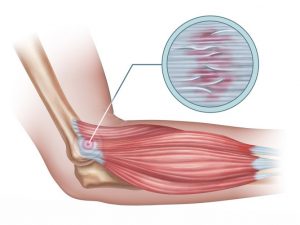Tendons form the attachment points between our muscles and bones and are found all over our bodies. Their main function is to transmit forces from our muscles, acting somewhat like a spring to amplify our own muscle forces, and to absorb external forces on the body. Each tendon is composed of a combination of fibrous collagen and stretchy elastic connective fibres, ensuring that they are strong enough to help you launch into a jump, but soft enough to absorb the impact of the landing.
Due to their role in all our movements, tendons are subjected to a high volume and a large variety of different forces, whether that be typing away on your computer at work or sprinting down the wing on the football field. When we look at what kind of injuries occur to our tendons, these tend to fall into two broad categories: acute tears and overload injuries.
Like any spring, tendons have a limit to how much force they can absorb. Due to their role in absorbing external forces, tendons can tear acutely, however this occurs less often than overload injuries. Tendon tears will usually occur in moments of high impact such as when landing from a jump, or a rapid acceleration (think the achilles tear suffered by NBA player Kevin Durant in the 2019 NBA finals).
Tendon tears are quite significant and require immediate care. Full ruptures may require surgery, however most partial and some full tears can be rehabbed with a period of immobilisation followed by a thorough rehab program.
Tendinopathy is the umbrella term used to describe a group of pathologies that may cause pain, inflammation, and a loss of function in our tendons. Whilst historically we have referred to these injuries as tendinitis (inflammation of a tendon) this term is not entirely accurate as not all tendon injuries have inflammation present.
Overload injuries occur when there is an imbalance between the ability of our tendons to do work (capacity) and the sum of all the forces they are exposed to (load). Unlike our muscles, tendons are slower to adapt to changes in load and do not typically enjoy rapid rises (or drops) in load. In the short term, overload may cause some pain and irritation of the tendon but this is usually temporary. In the long term, repeated overload causes increasing irritation and over time degeneration of the tendon fibres. Examples of a tendinopathy might include the tennis elbow that plays up whilst gardening or that niggly achilles that holds you back from running.

Whilst tendon injuries can be frustrating, they can be managed well with the right approach. The key to getting back on track is to manage any irritating factors with load management strategies, and to improve the capacity of our tendons with graded exercise. Just because you might be sore, this doesn’t mean you should stop exercising. As discussed earlier, a key factor in tendinopathy is an imbalance between work capacity and load, so whilst rest may help ease any pain that you are feeling you also likely lose work capacity as well. Once you try to come back to your chosen activity, the same imbalance is still there, or is maybe even worse. With this in mind, graded exercise and in particular strength training is integral to helping manage tendinopathy
Recovery times for tendon injuries can range from a few weeks to several months, so don’t let those little niggles settle in and make sure to start some high-quality rehab as soon as possible to get you back to your best.
Image credit: https://www.newsweek.com/kevin-durant-injury-how-long-out-1443283
STC has adapted to the COVID-19 crisis:
For those that do not need hands-on treatment or are in the vulnerable person category, we are now offering online physiotherapy and online classes, which are claimable via your health fund rebates.
We are still offering face to face physiotherapy services for those with significant musculoskeletal pain or post-surgical rehabilitation, this may change if the crisis escalates.
We are offering several classes online including Pilates and Mums & Bubs post/antenatal rehabilitation. We’re able to facilitate varied online classes, so if you’re more comfortable with conducting your rehab from home, let us know and we’ll arrange to have you dialled in online to a class.